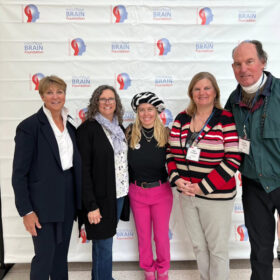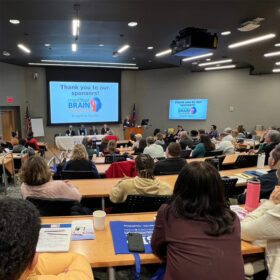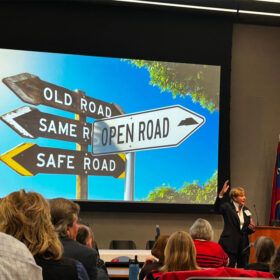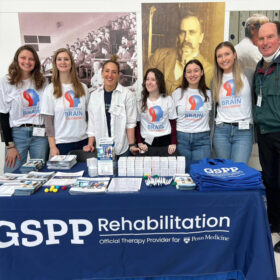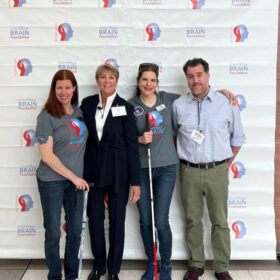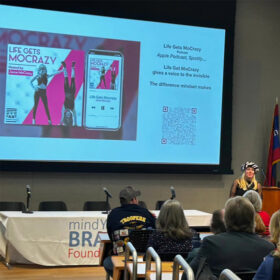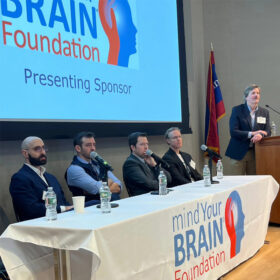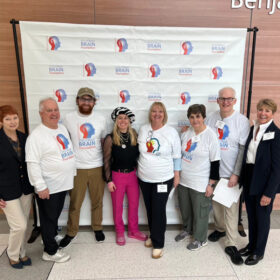Thank you to all our sponsors and attendees for making this another successful conference.
Click the button below to access recordings from the sessions that were presented in the auditorium at this year’s event. We encourage you to share the recordings with others who may benefit from these valuable resources, including your family, friends, and other members of the brain injury community. Additionally, click here to view the list of resource tables with links to their websites.
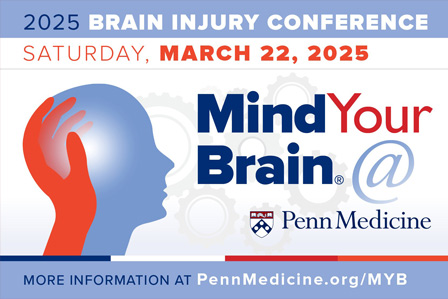
Mind Your Brain @ Penn Medicine 2025
To help us to continue to provide this conference free of charge to our survivors, families,
and caregivers, please consider a tax-deductible donation or include us in your estate planning.
Click here to donate.
Contact Information
Robin Armstrong
(610) 529-3194
robin@pennmedicine.upenn.edu
Conference Details:
Date: 3/22/2025
Time: 9:00 AM to 3:00 PM
Location: Jordan Medical Education Center (JMEC)
3400 Civic Center Boulevard
Philadelphia, PA 19104
MYB Workshop 2025 Session Schedule
Registration/Coffee 8:30 – 9:00am
Opening Remarks |
9:00 am – 9:15 am |
Keynote Speaker |
9:15 am – 10:00 am Jamie MoCrazy, Extreme Skier and TBI Survivor For more information, please visit https://www.mocrazystrong.org |
Resource Booth Highlights |
10:00 am |
Research Panel |
10:15 am – 11:00 am 15-minute travel time |
Workshop Session 1 |
11:15 am – 12:00 pm 1A. How We Talk About Brain Injury Presenter: Michael E. Keesler, JD, PhDDuring brain injury recovery, survivors learn that part of the new normal is talking about our brain injuries to others. Many also quickly discover that talking about these often-invisible injuries presents a host of challenges. But through a mixture of presentation and audience participation we will collectively share some winning strategies, words of caution, and whatever else comes up along the way.Target Audience: TBI survivors and caregivers1B. Demystifying Autonomic Dysfunction after Brain Injury: What is it and what are some non-pharmacological ways to reverse it?Presenter: Roni Lynn Robinson, MSN, RN, CRNP-BCCoping Autonomic dysfunction is very common after brain injury, but often goes unrecognized and is poorly treated. Also known as dysautonomia, Autonomic dysfunction refers to a disorder of the autonomic nervous system (ANS), which controls involuntary bodily functions such as heart rate, blood pressure, digestion, and temperature regulation. These changes can often affect how you feel every day and make it difficult to participate in your usual daily activities. This session will explore what autonomic dysfunction is and discuss non-pharmacological interventions people can take to reverse it.Target Audience: TBI survivors and caregivers 1C. Cryoneurolysis – A Novel Approach to Treating Pain Associated with Spasticity Spasticity is unwanted muscle tightness resulting from many neurologic conditions like Traumatic Brain Injury, Anoxic Brain Injury, Stroke and others. This can limit limb movement and cause pain. There are a variety of techniques used to try to improve spasticity, such as oral medications and botulinum toxin injections. In recent years, select rehabilitation clinics around the world have started using a procedure called cryoneurolysis for pain and spasticity. This session will review this new procedure and the evidence behind it. Target Audience: TBI survivors experiencing spasticity & caregivers of survivors experiencing spasticity. 1D. Community Integrated Services (CIS): Building an Inclusive Workforce The session will discuss the following: What is the Office of Vocational Rehabilitation (OVR)?, Should I apply?, How do I get started?, What services are available to me? and What is the Client Assistance Program (CAP)? This session will review what going back to work may look like for an individual. CIS will touch on funding for support employment and how an individual can get the process started. CIS will also discuss benefits counseling and how to access this service and why it is important to have benefits counseling if you are working or plan to go back to work. For personal service after the workshop please come see our Resource Table. Target Audience: TBI survivors and caregivers |
Lunch/Resource Booths |
12:00 pm – 1:15 pm |
Workshop Session 2 |
1:15 pm – 2:00 pm 2A. The Sense of Smell: A Sensitive Marker of Brain Health 2B. The Mind Body Connection and Building Resilience: Why it’s so important after Brain Injury Having a strong mind body connection and building resilience are life skills that are important for everyone, but especially for those who have sustained a brain injury or are caring for a person who has sustained a brain injury. These skills are helpful in reducing stress and aiding in achieving emotional balance. This session will focus on the normalcy of emotional changes after TBI and methods to support resilience and emotional wellness. Target Audience: TBI survivors and caregivers 2C. Breathe Easier! Evidence-based Breathwork and Meditation for Busting Stress and Boosting Wellbeing for TBI survivors and Care Partners On their road to recovery, TBI survivors often face mental health challenges including depression, anxiety, and mood disorders. Beyond impacting quality of life, these challenges are found to hinder recovery. In care partners, high levels of stress, burnout, and mental health challenges are common. Fortunately, there are innovative, evidence-based, and self-empowering techniques that can be adopted by TBI survivors and care partners for addressing stress and mental health challenges, while simultaneously boosting resilience and psychological thriving. This session will review these techniques and teach breathing techniques and meditation that participants can take back from the conference. Target Audience: TBI survivors and caregivers 2D. Multidisciplinary Neuro Rehab: How to Initiate Services & Get the Appropriate Script Given the new classification of TBI as a chronic injury by the Centers for Disease Control and Prevention (CDC), brain injury survivors are now able to reframe recovery. Survivors’ needs can now be addressed in phases throughout their life post-injury. Neurorehabilitative services are skilled therapies that provide a patient with the tools to access their activities of daily living (ADLs) and independent activities of daily living (IADLs) in their home, in the community, and in work settings as appropriate. This presentation will define neuro rehabilitation, identify multidisciplinary care as related to TBI recovery and adaptation, and educate on when/how/why to initiate outpatient therapy services. Survivors and caregivers will be provided with explicit instruction on how to obtain an appropriate script (doctor’s prescription for therapy), how to search for providers, and how to initiate care. They will understand the role of therapy during the lifelong phases of TBI and when to seek support. They will also understand the goals of outpatient multidisciplinary therapies and estimated timelines for length of care. Survivors and caregivers should feel knowledgeable and empowered to better manage their care within the context of chronic injury. Target Audience: TBI survivors and Caregivers |
Workshop Session 3 |
2:15 pm – 3:00 pm 3A. Tips and Resources for Fitness after Brain Injury 3B. Strengthening Relationships Between Survivors of Traumatic Brain Injury (TBI) and their Caregivers Utilizing the Principles of Trauma-Informed Care. TBI survivors are among the bravest and most vulnerable of humankind. Those entrusted as caregivers are faced with the challenge of providing physical and emotional support while fostering a positive relationship with TBI survivors. Implementing the principles of Trauma-Informed Care can help create and nurture a trusting relationship that improves health outcomes and reduces caregiver burnout. Furthermore, Trauma-Informed Care allows the opportunity for TBI survivors to wholly engage in every aspect of their life, providing a sense of their inherent human value and worth. This session is designed to help caregivers gain an understanding of how to apply the principles of Trauma-Informed Care to create a strong and positive survivor/caregiver relationship. Target Audience: Caregivers and TBI survivors 3C. Multidisciplinary Neuro Rehab: What to Expect in PT, OT, and Speech Therapy Sessions with Demonstrations Survivors and caregivers are invited to learn what a physical therapy, occupational therapy, and speech therapy session would look like for a mild brain injury/concussion survivor. Be prepared for an interactive demonstration of various therapy exercises/education. The physical therapy component will focus on vestibular/ocular reflex exercises, stretching, flexibility, and balance. The occupational therapy component will focus on symptom management, sleep hygiene, and routine development. The speech therapy component will focus on exercises for attention and memory. Target Audience: TBI survivors and caregivers |


